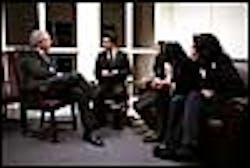Bush Meets with 9/11 Officer's Family
The son of a ground zero rescue worker who died last week from lung disease met with President Bush on Wednesday to urge expanded health services for those who are still sick.
"On behalf of all World Trade Center victims, I expressed the urgency and the desperate need for financial support for health services," said Ceasar Borja Jr., 21.
He said he told the president that the funding should be expanded not just for "the heroes and heroines" who risked their lives to save victims under the twin towers, but also for men, women and children exposed to toxins because they lived or worked in the area.
Borja's father, Cesar Borja, was a police officer who worked 14-hour days in the smoldering pit after the Sept. 11, 2001, terrorist attack. He died at 52 while awaiting a lung transplant.
Bush met Borja, his mother, Eva, his 16-year-old brother, Evan, and 12-year-old sister, Nhia, at Federal Hall in downtown Manhattan, where the president delivered a speech about the economy on Wednesday.
About an hour before the speech, sick 9/11 workers and neighborhood residents gathered nearby at the edge of ground zero to criticize Bush's proposal to spend an additional $25 million to fund a health care program.
"Twenty-five million is absolutely not enough," said Marvin Bethea, 47, pointing out that some legislators, including Sen. Hillary Rodham Clinton, have proposed $1.9 billion in additional funds.
"First responders who need treatment will get the treatment they need," Bush spokesman Tony Snow said Wednesday. "Many are already covered by insurance programs, many through their union; but if there are gaps in that, we're going to do it."
Next week, the Bush administration is expected to propose the additional funding for the Sept. 11-related health care program at New York's Mount Sinai Medical Center, where 19,000 rescue workers have been screened.
About seven out of every 10 responders suffered lung problems, according to a Mount Sinai study. One of study authors has said thousands will likely need long-term care.
White House officials said they would consider providing more money, depending on the findings of a separate government task force.
The programs had been expected to run out of money by the summer. A grant of $75 million made last year was expected to last until then.
Associated Press writers Devlin Barrett in Washington and Ben Feller in New York contributed to this report.

